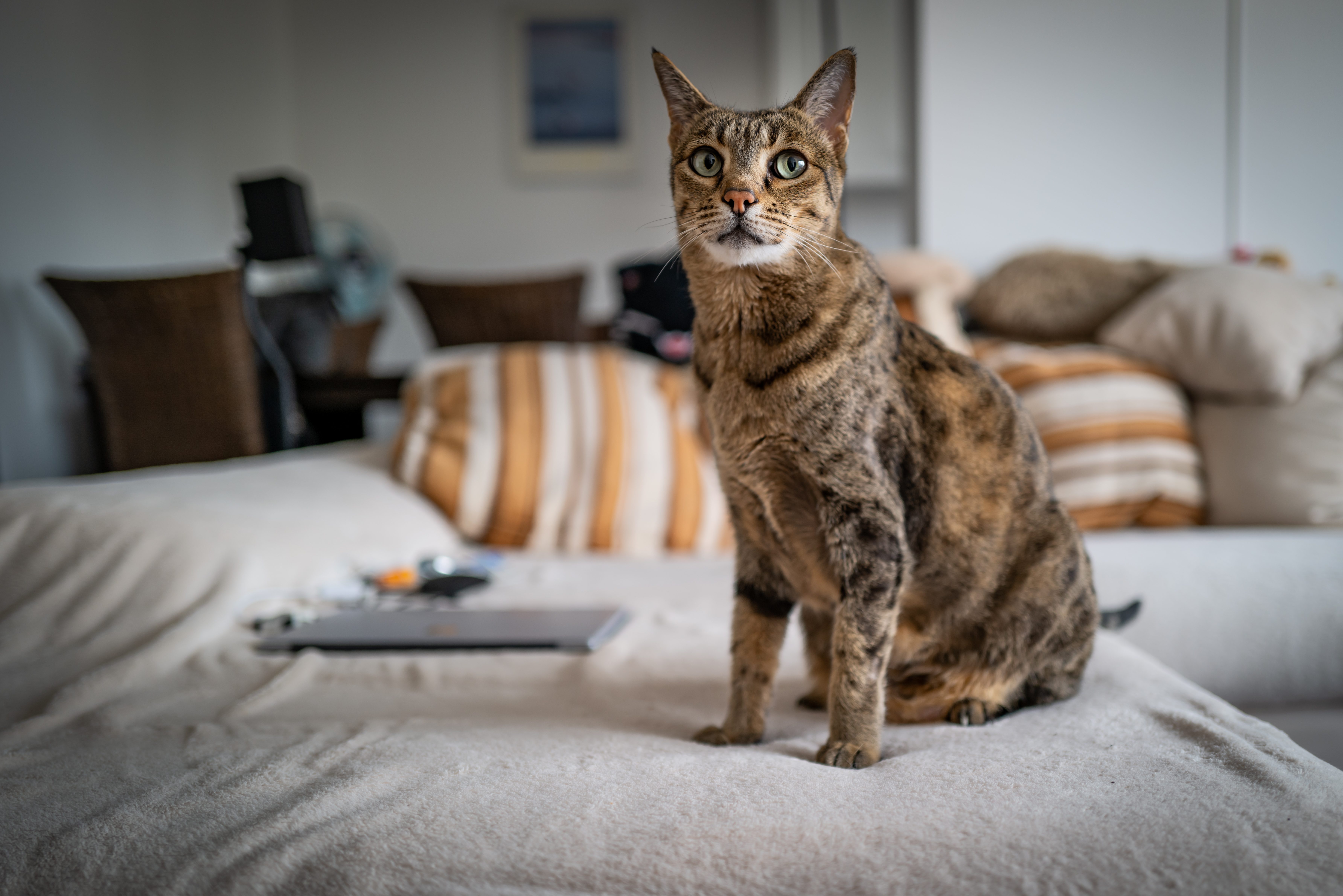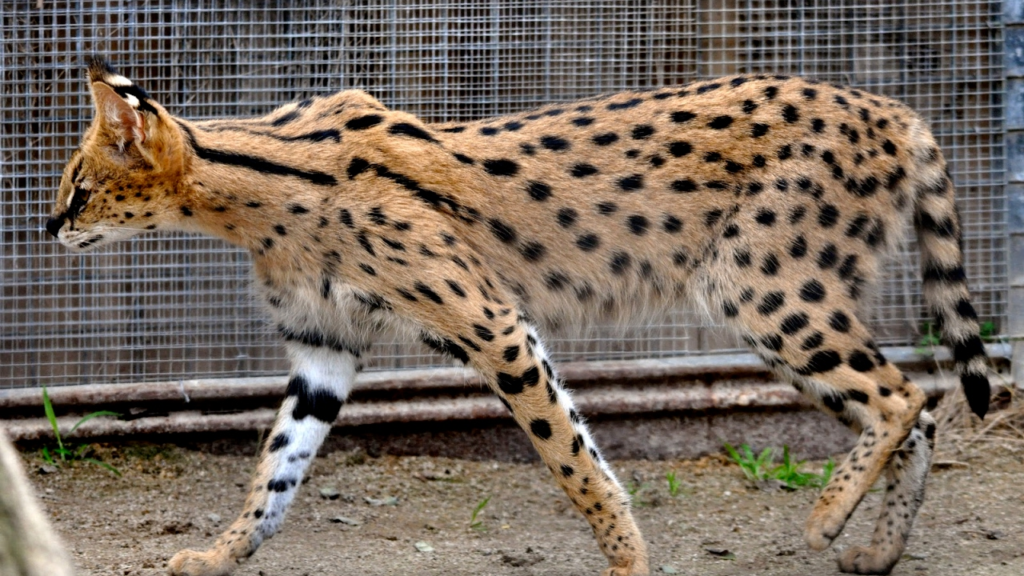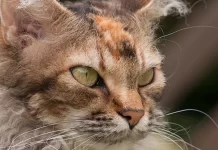
Last Updated on August 27, 2023 by Fumipets
Savannah Cat: A Captivating Blend of Wild and Domestic
The Savannah cat is a mesmerizing breed that has captured the hearts of cat enthusiasts worldwide. This unique feline is the result of crossing a domestic cat with a serval, a wild African cat species. The result is a striking blend of wild aesthetics and domestic charm, making the Savannah cat a captivating and sought-after companion. Here’s a summary of the fascinating traits and qualities that define the Savannah cat.
Savannah Cat
The tall and graceful Savannah cat made its debut in the latter half of the 20th century. A Siamese cat and a wild serval were crossed to create Savannahs, a hybrid breed. The breed keeps the enormous perked ears, long legs, and spotted coat of its African cat lineage while maintaining the affable disposition of a domestic companion, so this wildness is on full show.
You should be aware that Savannah cats are large. Depending on the generation, adult Savannah cats may reach heights of 17 inches and weights of 25 pounds. The F1 and F2 designations refer to first generation crossings, which are often bigger than subsequent crosses and have stunning spotty coats in brown, tan, and black hues. The colors and patterns of previous generations are still present in later generations, albeit being smaller and a little more subdued. Later generations are farther distant from their wild progenitor. Savannah cats are devoted, perceptive, and curious cats, but they may not be the greatest option for new cat owners.
Despite being a few decades old, Savannah cats are still a very uncommon breed. Some jurisdictions even impose limitations on them, often based on generation. Before bringing a Savannah cat home, it is a good idea to check the local laws.
Appearance
Speaking about elegance! Savannah cats are beautiful creatures that resemble small cheetahs due to their tall, slim stature and eye-catching spotted coat. The Guinness Book of World Records has recognized Savannahs as the tallest domestic cat in the world since they can reach heights of 17 inches. Savannahs may range in weight from 12 pounds for females to 25 pounds for males. The number of generations a certain cat has between her and her wild serval ancestry determines both her height and weight.
The Savannah is known for its black, brown spotted tabby, silver spotted tabby, and black smoke coat colors. Their short, thick coat requires just a brief brushing once every few weeks to keep it in great condition. Their eyes are another characteristic that sets Savannah cats apart from other kinds. The Savannah has almond-shaped, somewhat hooded eyes that have a penetrating look and a dark tear duct line. Usually, but not always, the coat color is reflected in the eye color.
Before taking home a kitten, Heather Tarticchio, the Savannah cat breeder behind TICA-registered St. Louis Savannahs, advises doing your homework.
Savannah cats come in a variety of generations, sizes, and dispositions, according to the woman. “Be sure to identify the generation that is best for you.”

Temperament
A Savannah is perhaps not the greatest pick if you’re searching for a sleepy lap cat. Savannah cats can jump an incredible 8 feet in height, therefore she is more likely to do that than to dally by her food dish. Savannah cats are athletic and energetic.
The Savannah cat is sometimes described as more dog-like than cat-like since it is always seeking out new challenges to investigate. These lean and athletic cats also like the water, so they won’t think twice about joining you in the shower or wading in a kiddie pool. Savannahs are very simple to train, so some owners decide to put their cat on a leash and take them on outside excursions.
It’s crucial to socialize your Savannah kitten since these large indoor cats have a tendency to be wary of strangers. Savannahs are very devoted, much like dogs, and will follow their favorite people around the home just for company, giving them the moniker “Velcro kitties.” Although this isn’t always the case, they have a reputation for being quite chatty and using a range of unusual vocalizations.
For the appropriate household, Savannahs are wonderful family pets, according to Tarticchio. They are not suitable for a home where the owners are never home since they are high-energy and need a lot of care. However, if they are reared with any animal, they will connect with that animal if it is open to receiving their unceasing love. For this reason, kids and dogs make wonderful friends.
If you’re considering getting a Savannah cat, keep in mind that the litters are designated as F1, F2, F3, etc. These figures indicate the number of generations that have elapsed since the initial wild serval genes were incorporated into a certain line of breeding. So, the likelihood that you’ll see a little bit more wild behavior (climbing, pouncing, and “hunting” their toys) increases as the number decreases. Also keep in mind that Savannah’s earlier generations tended to be heavier and bigger.
All cat breeds, but particularly Savannah cats, need mental stimulation, according to Marilyn Krieger, a licensed cat behavior specialist in San Francisco.
Savannahs are really smart and need a lot of enrichment and activities, according to her. Krieger advises clicker training to help keep children engaged both cognitively and physically.
Living Needs
It doesn’t really matter how big your house is if you have Savannah cats. It matters if you provide her with a lot of areas to run, climb, and hide. This involves providing her with at least one cat tree and a ton of tough, engaging toys. Additionally, having a lot of scratching posts and scratcher toys throughout your home or apartment will certainly be beneficial given how busy she is and offer her lots of opportunity to stretch and scratch.
She will adore any screen-based cat amusement, whether it is tablet-based interactive cat games or footage of birds and squirrels. Your Savannah will also pass many hours tossing toys in a little pool or pan of water if you give her the room.
Keeping any plants and breakable items away from exposed shelves where your cat may knock them over is another suggestion. Savannahs can jump up to 8 feet high from a nearly standing posture, so even the top of your refrigerator is not safe from their muscular legs. Keep this in mind. Always keep an eye on your pet while they are outside since they may leap over fences.
Savannah cats are prone to boredom, so sharing a space with another cat or dog might be beneficial. These sociable cats dislike spending extended periods of time alone. “They would prefer to have their owners around 24/7,” Tarticchio claims. However, Savannah cats may live without their owners during regular business hours.
If you can, provide them access to a secure outside area like a patio or screened porch (a “catio,” if you will). Your Savannah will gladly spend the day outside taking in the fresh air and making plans for how to safely capture squirrels.
Consult with your local government first, however, before adopting a Savannah cat. Due to the cat’s wild heritage, certain towns have more stringent ownership rules.
Care
Your Savannah cat requires plenty of mental stimulation in addition to routine veterinary treatment if it is to have a happy and healthy life. She just needs the occasional brushing to remove dead skin and stray hair from her short coat. A Savannah requires regular nail trimming and proper dental hygiene, much as other breeds. Just keep in mind to begin nail and dental care when your cat is still a kitten; that way, you won’t have to wrestle your (very huge) Savannah when it’s time for basic upkeep.
When Savannah is young, make every grooming session enjoyable for her by rewarding her with food or toys. Start leash training early if you want to take your cat on outside trips. Always start small and don’t compel your cat to do anything against her will.

Health
Savannahs should be spayed or neutered as soon as your veterinarian suggests it, just like any other pet cats. Although male cats from the F1, F2, and F3 generations are often infertile, neutering is still strongly advised to help prevent any undesired tendencies from developing.
Being hybrids, Savannah cats have a long lifespan, and although they may be vulnerable to typical feline illnesses, little is known about what health issues, if any, they are predisposed to. When you bring a Savannah home, you’re bringing home a companion for life since they may live for 12 to 20 years.
History
In 1986, the world was presented to the first Savannah cat, which was appropriately called Savannah. A male wild African serval cat and a domestic Siamese cat were crossed to create the first tribe member. The baby had the same stunning spotted coat and physique as the wild cat, but she still had her mother’s warm, amiable personality.
Breeders quickly saw the potential of this magnificent animal, and as the years passed, the population of Savannahs increased and additional generations were produced. The International Cat Association officially recognized Savannah cats as a breed in 2001.
Q&A: Savannah Cat
Q1: What sets the Savannah cat apart from other breeds?
The Savannah cat stands out due to its distinctive appearance, which includes a sleek, slender body, long legs, and bold coat patterns reminiscent of its wild ancestor, the serval.
Q2: Is the Savannah cat recognized as a breed?
Yes, the International Cat Association (TICA) recognizes the Savannah cat as a distinct breed. It’s classified into several generations based on how far removed they are from their serval ancestor.
Q3: What is the temperament of the Savannah cat like?
Savannah cats are known for their active and playful nature. They are intelligent, curious, and often enjoy interactive playtime. Their behavior can vary based on generation and individual personality.
Q4: Are Savannah cats suitable for every household?
Savannah cats require experienced owners who understand their unique needs. Their high energy levels and inquisitive nature mean they thrive in homes that provide mental and physical stimulation.
Q5: Can Savannah cats be kept as outdoor pets?
Due to their strong hunting instincts and potential interactions with local wildlife, it’s recommended to keep Savannah cats as indoor pets. Creating an enriched indoor environment helps fulfill their need for stimulation.
https://www.youtube.com/watch?v=abuAUjFv88s

















